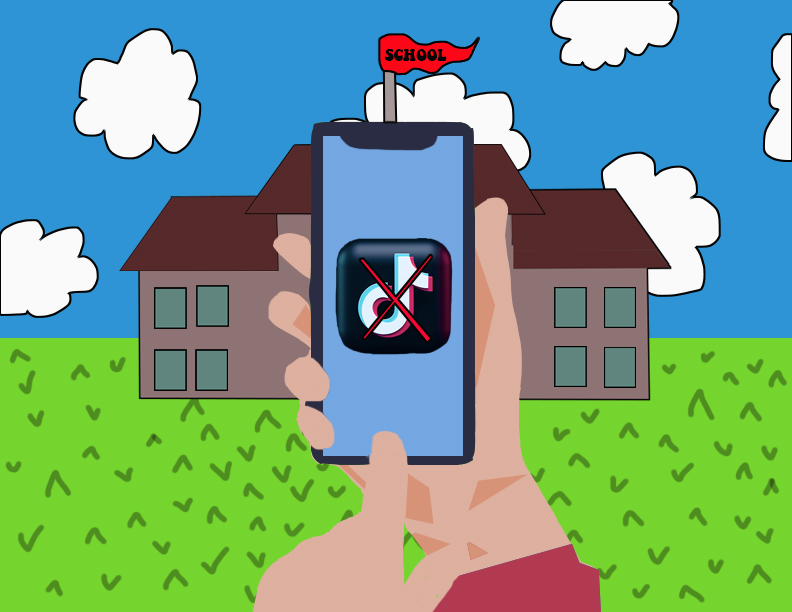Freshman Saria Trivedi does not have TikTok on her phone.
“My morals go against it,” she said.
For her, the problems lie with the app’s connections to both depression and misinformation, as well as another connection: one to a Chinese company. For several months, the U.S. government, organizations and colleges have been discussing banning the app TikTok for employees and students. According to a 2022 study by the Pew Research center, 67% of teenagers use TikTok regularly and the app’s usage does not end with teenagers.
“Everybody uses it, even my mom and dad both have it,” freshman Zuri Simiyu said.
But while even Simiyu’s parents use TikTok, as of December 2022, 4 million U.S. federal employees on government devices cannot. Recent fears over data security and data mining had led multiple state governments, government organizations and universities to ban the pervasive app, mostly due to speculation that the Chinese government will obtain access to the data and use it to attack the U.S.
However, the Chinese company that owns TikTok, ByteDance, has explicitly denied sharing any personal user information with the Chinese government. There are no facts supporting the idea that the company is sharing information with the government at any higher rate than U.S. companies are sharing to America’s government. Despite this, the fears of data mining, possibly motivated by America’s historical fear of China and communism, continue.
“When you download [TikTok] onto your phone, that application has the ability to go through your phone and look at your content, look at your images and look at any applications you have,” computer science teacher Kristen Cordes said.
This data mining gives the app access to a large amount of data, even if a person never opens TikTok. However, the same is true of most other social media sites regardless of what companies own them. Plenty of apps and sites mine user’s data such as Facebook and Twitter, both of which are originally American companies.
When reading the TikTok privacy policy that all users must agree to, there are some shocking details hidden in lengthy documents. In addition to terms such as “metadata” and “cookies,” the app states it has permission to track location, keystrokes and device model even when users are not using the app.
“If you have to put in a password to get to your banking information or if you have to put in a password to your AP website to take AP tests, that [app] has the ability to keep track of all of that, because all of that’s data,” Cordes said.
However, this biometric data that TikTok is supposedly stealing is not as private as one may think. In fact, U.S. domestic airports have begun implementing technologically-based facial recognition systems, taking scans of passengers’ faces, storing them and cross-examining them with other collected information with the ultimate goal of preventing imposters.
And there is a precedent for this information, collected and stored by the U.S. government, to be stolen. In 2019, the U.S. Customs and Borders Protection and the Department of Homeland Security had a data breach, compromising almost 184,000 passenger photos.
Despite only being based on speculations, the concern is not only surrounding data mining, but also the theory that TikTok’s algorithm could potentially be used to manipulate or influence people.
When signing up for common social media apps, users give over their names, ages and a phone number or email address. Some apps like TikTok and Pinterest also ask for a list of interests in order to refine the media presented. Once a person is using one of these apps—such as Instagram, Facebook and TikTok—the information gathered does not end there.
By now, “the algorithm” that TikTok uses to pick users’ videos is infamous. The app uses everything from liked trends to individual video watch times to decide what to send each user’s way.
“When you have access to our internet system, then you can spread information that’s not true because you can spread that fact or opinion to a specific group of people,” Cordes said.
However, as with many of the other points commonly made against TikTok, this is not only done by the ByteDance-owned app. According to a 2021 study, Instagram topped the chart of data sharing, reportedly sharing an astounding, but not at all surprising, 79% of its users data with third parties and the highest bidder.
Cordes explains that TikTok is very good at finding what people like and showing them more of exactly that. This can be dangerous as it often leads down rabbit holes that are not necessarily factual.
“Because of the data mining they’ve done, they know that these three people like dogs and these three people don’t,” Cordes said. “So they’re going to target that information towards you.”
As people are becoming increasingly aware of potential threats regarding data policies, the government has begun to take action.
Even though TikTok does not seem to pose any more of a threat than any other app of its kind, its connection to a Chinese company is why FBI director Christopher Wray said the FBI had “national security concerns.”
These speculations, for which Wray provided no supporting evidence, are why as of Dec. 15, 27 U.S. states, including Texas, have banned TikTok on government devices.
All over the country, federal employees and college students are being barred from using TikTok. One notable university that has blocked TikTok is A&M University. As of Jan. 18, users connected to any A&M network are blocked from using the video sharing app. Current A&M student Austin Wagner said he sees the logic behind these decisions.
“I was okay with it because there’s been a lot of [issues with] data and privacy,” he said.
Wagner believes that this is particularly important given that the campus in College Station has government connections, namely the Department of Defense. This is likely a driving force in the choice to block TikTok.
The Department of Defense is currently funding a five-year plan, started in 2020, focused on promoting hypersonic flight and aerospace engineering at A&M. For this project, the school receives about $20 million annually.
Despite the fact that Wagner agrees the popular app should be blocked, he also recognizes the inefficiency of the current A&M policy.
“I think most people just switch to cellular to watch it,” he said. “It’s kind of pointless because [TikTok] can still get your [personal] data from cellular.”
In addition to very little change in student lifestyle, there was also very little reaction from the general student population.
“I think I saw a couple of memes about it, but there haven’t been any protests or demonstrations or anything like that,” Wagner said.
Similar to Wagner, Simiyu understands why TikTok has been banned. However, she doesn’t see the app permanently going away any time soon.
“I feel like it’s just something that we need,” Simiyu said. “I know that sounds silly, but it would be weird not having TikTok.”




